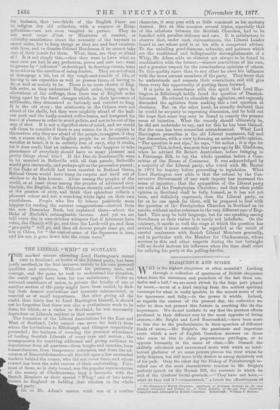THE LIBERAL " WHIP " IN SCOTLAND.
THE marked success attending Lord Hartington's recent visit to Scotland, as leader of the Liberal party, has been justly ascribed, in the first instance, mainly to his own personal qualities and exertions. Without his patience tact, and courage, and the pains he took to understand die situation, the result might have been far less satisfactory. Under an outward semblance of union, in private the loyalty of one or another section of the party might have been cooled, by find- ing their dearest convictions and interests misconceived, or counted as of small importance. But after giving all the credit thus fairly due to Lord Hartington himself, it should not be forgotten that there was also a preliminary work to be done, for which, as a visitor to Scotland, he was necessarily dependent on Liberals resident in that country.
The formation of the Liberal Associations for the East and West of Scotland, (why cannot one serve for both ?) from whom the invitations to Edinburgh and Glasgow respectively proceeded ; the business of securing the personal attendance of leading Scottish Liberals of every type and section ; the arrangements for receiving addresses and giving audience to deputations from all quarters—from burghs and counties, from tenant-farmers, from temperance reformers, and from the ad- vocates of Disestablishment--all this fell upon a, few unwearied workers behind the scenes, who did not covet fame, and whose reward has been the solid success of their undertaking. Fore- most of these, as in duty bound, was the popular representative of the county of Clackmannan, long a favourite with the Scotch Members as their special "Whip," and of late better known in England as holding that relation to the whole al party.
far as Mr. Adam's unseen work was of a routine character, it may pass with as little comment as his modesty desired. But on this occasion several topics, especially that of the relations between the Scottish Churches, had to be handled with peculiar delicacy and care. It is satisfactory to observe that, under such circumstances, the Liberal Leader found in one whose post is at his side a competent adviser. To the unfailing good-humour, urbanity, and patience which are the traditional and indispensable accomplishments of a Whip, Mr. Adam adds an element not always to be found in combination with the former,—sincere convictions of his own, and a genuine respect for the conscientious opinions of others. To this quality more than to any other he owes his influence with the more earnest members of the party. They know that he understands and respects their convictions, and will give them every fair opportunity of putting them forward. It is quite in accordance with this spirit that Lord Har- tington at Edinburgh boldly faced the question of Disestab- lishraent. He refused to stimulate the agitation, and expressly dissuaded the agitators from making this a test question at elections. But on the other hand, he roundly declared that he would be no party to repressing discussion, and he held out the hope that some way may be found to remedy the present sense of injustice. What the remedy should ultimately be, he did not undertake to say, and for this he has been blamed. But the case has been somewhat misunderstood. What Lord Hartington prescribes is the old Liberal treatment, full and fair discussion, with a view to forming an united public opinion.
The question is not ripe," he says, "for action ; it is ripe for inquiry." This, indeed, was seen four years ago by Mr. Gladstone, when he advised Sir Robert Anstruther, before bringing in a Patronage Bill, to lay the whole question before a Com- mittee of the House of Commons. It was acknowledged by a majority of the Liberal party, who voted with Mr. Baxter in 1874 for inquiry before proceeding to legislation. What Lord Hartington now adds is that the refusal by the Con- servative Government of any such inquiry has increased the sense of injustice ; that the sympathies of the Liberal party are with all the Presbyterian Churches; and that when public opinion in Scotland shall be fully formed, as it has not yet been, and definitely expressed, then the Liberal party, so far as he can speak for them, will be prepared to deal with the question of the Presbyterian Churches in Scotland on its merits, without undue reference to the very different case of Eng- land. This may be bold language, but for one speaking among Scotchmen as their visitor it is surely not indefinite. On the contrary, it marks so well the stage at which the question has arrived, that it must naturally be regarded as the result of careful conference with Scotch Liberal Members generally, and in particular with the Member for Claekmannan, whose services in this and other respects during the last fortnight will no doubt increase his influence when the time shall come for rallying his party at the polling-booths.






































 Previous page
Previous page